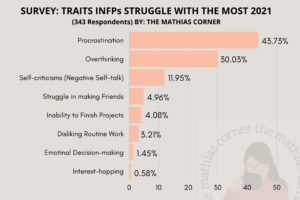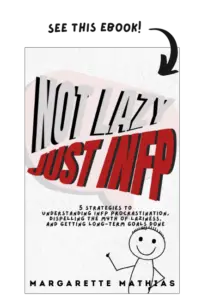What’s INFP Personality?
INFP is an acronym for a person who’s Introverted-iNtuitive-Feeling-Prospecting. It’s a rare personality type among the 16 Myers-Briggs personality types composing only 4.4% of the population.
INFPs are known for their idealism, authenticity, and passion. However, INFPs also struggle with “negative” traits that others often misunderstand.
Upon pinpointing the INFP “weaknesses,” I tried to turn these into better perspectives. We are hardwired this way to direct us on a bigger purpose.
8 Most Common INFP Weaknesses
Per the survey I conducted among 343 INFP respondents, here are the percentage of weaknesses INFPs struggle with the most:

The survey shows that 43.73% of INFP respondents struggle the most with Procrastination, followed by Overthinking (30.03%). The least problematic was Interest-hopping which received only 0.58%
8 INFP Weaknesses and How to Turn Them into Strengths
Many INFPs struggle with these traits, often leading to a lack of motivation. As a result, they end up feeling lonely and not enough.
I’ve been there, too, and I am a work-in-progress. But I think I have done enough for myself to escape the cage of these “weaknesses.”
Here’s what I did to turn INFP weaknesses into Strengths and become a happier and more composed INFP.
1. Procrastination

Procrastination is the act of setting aside and postponing specific tasks. At the same time, it’s a way to keep yourself in your comfort zone by putting off complex tasks.
For example, doing your assignment churns and heats some brain cells, so you postpone it as long as possible. Another example, you feel like your plans won’t take off, so you stop and stay in your comfort zone to avoid massive disappointments.
INFPs’ approach to tasks is “Prospecting,” which means they are spontaneous and flexible yet fond of last-minute changes.
Although prospecting may sometimes work, this aspect significantly weighs productivity down.
How to stop procrastination
Committing to these two steps decreased my struggle with procrastination:
- Set Deadlines with 3rd party involved
- Have time to Procrastinate
It’s not a be-organized-and-set-a-schedule-then-religiously-follow-it kind of advice. Nope.
For INFPs, that doesn’t work.
I’ve organized my schedules before, only to realize that I spent more time scheduling than following them.
Step 1: Set deadlines with 3rd party involved
INFPs are often last-minute workers, and their drive to start doing tasks is deadlines.
To make effective deadlines, there should be a 3rd party – a client or your employer – waiting for the results.
Setting deadlines with a 3rd party involved works best for INFPs. However, big procrastinators we are, we dislike disappointing people.
Step 2: Have Time to Procrastinate
“Oh! We want to diminish procrastination, yet we must procrastinate? Are you not contradicting yourself?”
I’m not. As introverts, INFPs must have a good balance between peace (procrastination) and pressure. Again, a good balance.
The deadlines provide pressure on us to work.
Procrastination provides recharging for us to keep going.
It’s a better strategy than burning yourself out for a week and not functioning for a month.
I remember the last time I got overworked in a company. Well, I resigned.
According to my survey, about 43% of INFPs “struggle” with procrastination. But actually, a good dose of procrastination keeps an INFP functioning.
For a more in-depth discussion about INFP procrastination, check out the “Not Lazy, Just INFP” E-book.
2. Self-criticisms (Leading to Anxiety)

Self-criticisms are hard to fight. Too much, and it would twin with perfectionism. If it keeps going, you will have to deal with excessive self-consciousness sooner or later.
Even I struggled with it last year.
INFPs are pretty hardcore on negative self-talk.
Moreover, we think people can’t help us. Not because they can’t understand us, but because INFPs rarely listen to anyone’s advice.
The healing process for an INFP is very personal and solo work.
So how did I get past the horrors of self-criticism?
How should an INFP deal with self-criticisms and anxiety?
- Face the problem
- Recognize which is your fight and which isn’t
Step 1: Face the problem
We get so anxious for various reasons. Feel that you’re not good enough? Fear of humiliation? Fear of failure?
The next thing we know, we’re crippling back to our shells.
I found that facing the problem is a step to overcoming anxiety.
It may be a hard truth to swallow. But the reality is that we don’t need to fight all the problems we can think of. We have to face it and realize most of it isn’t within our control.
Step 2: Recognize which one is your fight and which isn’t
It’s your fight to write and finish a novel, but you can’t control which publishers accept your work.
You can practice well and set your mind on winning but can’t dictate the game’s result.
INFPs must stop criticizing themselves for things that are beyond their control. Learn that it’s not your fight. Let the problem solve its own.
3. Emotional Decision-making

INFPs have two modes in decision-making:
- Deciding with excitement
- Deciding with restlessness
How do INFPs Overcome Emotional Decision-making?
1. Avoid Deciding when you’re too excited.
When INFPs get excited with an idea, we agree with a passion and start it right away. But on the downside, we have trouble maintaining the same enthusiasm. We over-promise, yet we stop even before we see results.
To avoid this, have time to write down your options, the advantages, and the disadvantages. Settle a good layout before accepting or declining an idea.
2. Deciding when restless
On the other hand, restless INFPs take gradual actions. But once the negative emotions get saturated, we tend to make “irrational” yet big decisions.
For example, INFPs can give up high-paying jobs that make a comfortable living just because it doesn’t sync with passion. It’s illogical for others, but passion and emotional health play significant roles.
When to leave a job, relationship, or organization
When a job diminishes the fire, I advise you to leave it after taking considerable experience.
We, INFPs, feel misunderstood because we try too much to conform to society’s standards. We’re free spirits, and conforming deludes us from our purpose.
If you don’t like your job, consider leaving it. If there’s no respect served in your current situation, you don’t need to stay.
Being an INFP is irrational in the eyes of others. But from my perspective, being emotionally driven is redirection to pave our path.
4. Confused with too many interests

INFPs are jacks-of-all-trades. Our idealism brought about seeing potential in almost anything.
I have many interests but can’t decide which one to prioritize. It feels like getting stuck in a labyrinth. The twist is that every route’s a way out, yet we choose to remain stuck.
How do INFPs overcome interest-hopping?
My simple answer – walk on all routes.
Have you experienced getting frustrated because you want to start a plan here and there? What would be the issue if you tried them all? Almost none. Interest-hopping is but a minor issue.
The real problem is when we listen too much to the people who can’t cope with our spontaneity.
We’re told to pick one and master it. But for INFPs, that’s a recipe for caging ourselves.
The sad truth – trying to fit in with the “norm” removes the shine of INFPs.
We must realize that interest-hopping isn’t a problem. Don’t suppress it, and be open with ideas.
INFPs love to explore, and it provides us better perspective and standpoint.
5. Overthinking
Overthinking was my enemy before I graduated.
What if I don’t get the job? What if I don’t earn enough?
I had so many what-ifs that made keeping up with the present difficult.
But INFPs can battle overthinking easily. The answer is action.
Daniel Carnegie quotes: “Inaction breeds doubt and fear. Action breeds confidence and courage. If you want to conquer fear, do not sit at home and think about it. Go out and get busy.”
Instead of thinking of the solution, act on the solution.
To become a happier introvert, work on a solution rather than staying at home and spending hours overthinking.
6. Struggle in making friends
Would you believe I told you that INFPs aren’t bad at making friends?
“You don’t know what you’re talking about. I don’t have friends.”
Wait, I’d share my story with this one.
I had a lively and energetic high school life. College – quite good, too.
But after I graduated, the animated version of me, which was often described to carry a “smiling face,” turned gloomy and had a poker face as default.
I was devastated by how much I had changed.
I wondered why I couldn’t make good friends at work. Things started adding up when I asked my high school friends to take an MBTI test.
I was astounded to learn they were INFJs, INFPs, and one ENFJ.
INFPs aren’t bad at making friends
My conclusion is that INFPs aren’t that bad at making friends. Instead, we’re picky about who enters our circle.
INFPs are a hard nut to crack. And making friends isn’t the real issue. What’s hard is to find ones that share the same beliefs.
Just be true to yourself and hang in there.
Finding friends may be like what the memes say – either “an extrovert adopts you” or get magnetized with the like personalities.
7. Can’t keep routine work

INFPs can’t stay long on jobs they don’t love.
We want a job that stimulates our imagination, talents, and creativity. We crave mysteries that probably come in the form of human psychology.
Furthermore, INFPs desire financial stability, but not if it suppresses freedom and flexibility.
Look Closely at which Factors in a Job Interest You
Job-hopping delivered me to where I am today.
I worked as a call center agent, multi-level marketer, auto mechanic, marketing assistant, and university teacher.
But guess what? I’m now a blogger and freelancer. I don’t know where I’ll be next, but I’m open to life’s suggestions.
Use such experiences to find your place. You wouldn’t know where you should be if you didn’t take a step where you shouldn’t.
Disliking routine work doesn’t equate to laziness
When INFPs genuinely love the job, they can exert much effort to do it. I found writing fulfilling and energizing.
But I’m not too fond of routine work where I must follow a regular schedule.
A piece of advice for my fellow INFPs, try comparing different career paths such as writing, traveling, and business. In these jobs, you handle your own time and progress.
This may solve the likeliness of frequent job resignations.
8. Inability to finish projects
“Project starters but aren’t finishers.”
Out of all the INFP weaknesses listed above, I think this one’s truly problematic and needs to be worked on.
INFPs love starting just about anything – which is good. We’re the initiator, the idealist, and the planner.
However, INFPs don’t reach completion due to certain misconceptions about the journey to success.
INFPs crave magical, glorious, mesmerizing success after their struggles. But when they see the “reality,” the boredom and little trickles of progress eventually don’t appeal to them.
INFPs want success, and they want it now. Without instant gratification, it’s difficult for INFPs to keep working on their plans.
INFPs must break down a task into small, bite-sized goals.
INFPs must break down the journey into small partitions and learn to love bite-sized successes.
Set realistic goals like finishing a chapter a day instead of finishing the whole novel in a month.
Stop imagining the result. End results are milestones, but when you get there, it isn’t as cloud nine as you thought. You will eventually have to move forward and leave it.
The life and thrill all happened during the process.
Conclusion
INFP weaknesses aren’t really weaknesses.
I always asked why I felt differently. I realized that INFPs are hardwired like this to serve a purpose – not to conform, to motivate others, to generate ideas, to be a friend to people, and to discover the many potentials we have in life.
Gotta love INFPs!
FAQS
Are INFPs Good Leaders?
INFPs are compassionate leaders. They would lift those people who need their guidance. INFP leaders are empathetic, rich with new ideas, and welcome innovation.
Are INFPs intelligent?
INFPs are as smart as the Thinkers. Only, they express their knowledge for a different purpose, such as understanding human connection, compassion, and existential factors.
Was this helpful? If you’d like to support my work, you can buy me a coffee at Ko-fi! Thank you! 🙂
You may also like:
- 5 Healthful Ways INFPs Overcome Procrastination
- INFP Friendship: 3 Reasons Why INFPs Are Hard to Get to Know
- 8 Qualities that Make INFP Attractive Without Trying Hard


